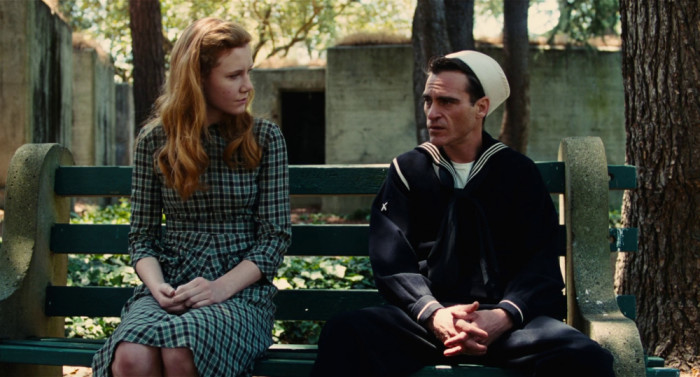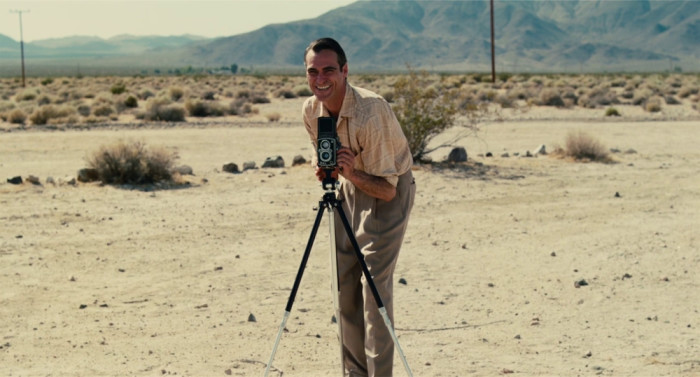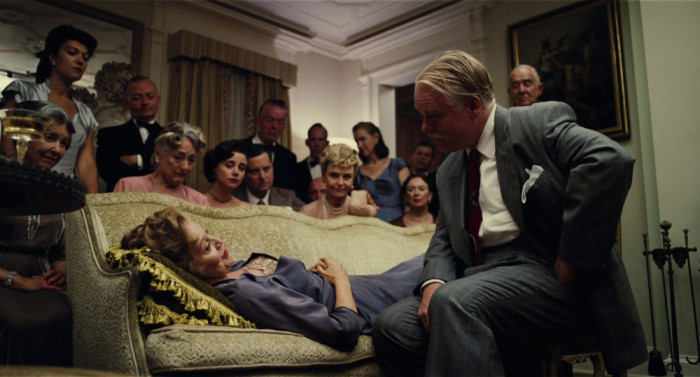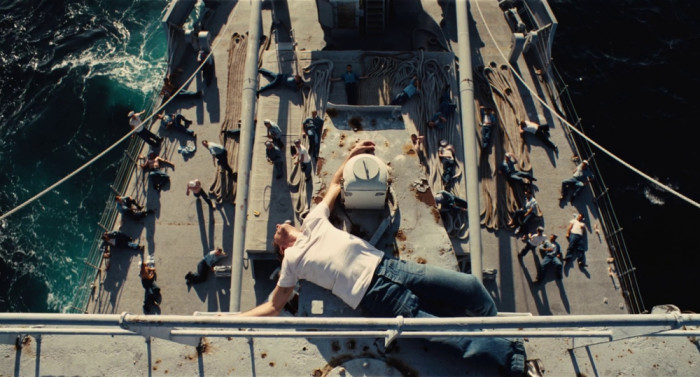In 'The Master,' Philip Seymour Hoffman Smiles Down On Us All
On February 2, 2014, Philip Seymour Hoffman passed away at the age of 46. The actor left behind a singular body of work that has garnered him lasting praise for his dedication to craft. In the January 2018 issue of Vogue, his longtime partner, Mimi O'Donnell, reflected on the personal loss of him as a collaborator and as the father of her three children. Even for those of us who never met the man in real life, there is a loss that is felt, but the nature of Hoffman's work as a film actor is such that he continues to live on on-screen.
What's the greatest Philip Seymour Hoffman performance? Everyone probably has a different answer to that question. The film of his that hits me the hardest happens to be one of his last. It's a film that is deep and devastating, made with his frequent collaborator, Paul Thomas Anderson. Hoffman plays a character named Lancaster Dodd and to this day, just thinking about the film calls up heavy emotions for me, because it came at a time in my life when I had just moved, didn't know a lot of people outside of work, wasn't in a relationship, and was cut off from family and friends, who had all just become Skype faces seen from half a world away.
In a weird way, these living circumstances may have primed me to receive the film and its themes on a more empathetic level than I would have otherwise. This is all a roundabout way of saying: Dodd is God. That is my reading of The Master.
The Dodd-is-God takeaway may seem like a strange one to have, since it comes from a movie in which Hoffman plays the leader of a movement (don't call it a cult) that ultimately may be nothing more than a sham excuse to round up a bunch of stray social animals and form a quirky community with them. Human beings have been nurturing the impulse for tribalism since the dawn of recorded history. Each tribe looks to a leader, and as a leader, Lancaster Dodd has readily evident flaws that at times paint him as nothing more than a charlatan.
However, when you line Dodd up against Freddie Quell — the film's animalistic main character, played by Joaquin Phoenix — he starts to look a lot more favorable by comparison. In Freddie, we see a figure who acts out in such weird ways that it's as if he's lobbying to be the ultimate dysfunctional human being. In that capacity, he symbolizes the screw-up in all of us. First and foremost, Freddie is a slave to his own aberrant behavior, but when he meets Dodd, life presents him with the chance to serve a new master and be part of a family.
Themes of redemption and disappointing fathers and wayward sons run all throughout Paul Thomas Anderson's filmography, and this includes The Master. In Boogie Nights, Anderson turned a sympathetic lens on people in the porn industry. He was able to humanize them, or at least use their milieu as the setting for an unlikely family drama. In the same way, The Master wiggles past all the sticky Scientology comparisons made about it to just show a troubled loner, Freddie, struggling to integrate with a group of people. "The Cause" is a community, not a cult. It's a haven for lost souls.
So how exactly is Dodd God? Well, it depends on what your definition of God is. One of the things 12-step programs like Alcoholics Anonymous will try and get a person to do is recognize the need for a higher power, then surrender himself or herself to that power (in whatever form it may take; atheists can also have a higher power). In The Master, Freddie's higher power is embodied by the ruddy complexion of Lancaster Dodd.
The Family Film
It may sound like a funny endorsement, but if the "cult" word must be used, then all I can say is that if you're on the same emotional wavelength as The Master, it might make you finally understand the appeal of joining a cult. The reason the film works for me is that I view it as a doomed romance steeped in the basic human need for familial love.
Anderson himself floated an idea like this in the press when the film premiered at the 2012 Venice Film Festival. "I think we were just trying to tell a love story between these guys," he said.
I would argue that the film isn't even really a bromance, but rather, a story about a guy cut off from the love of family, who has a shot at a surrogate unit led by the one person in the world who seems to see something in him beneath the uncouth outer layer, with its penchant for dirty words. (In the grand tradition of Magnolia's Frank T.J. Mackey seminars, there's some fine cussing in The Master. My personal favorite is this outburst.)
Because it makes for good drama, the guy in question rejects that shot at a family due to his own fickle nature. The arc Freddie Quell undergoes in this film is one of regression or reversion. You could view it through a humanistic lens, and say there is nothing spiritual about his journey, insofar as the word "spiritual" would imply something beyond this earthly realm. In that case, Lancaster Dodd would just be a mentor or father figure, not a character symbolic of any deity.
It could be that Dodd is right when he addresses his followers and says, "The source of all creation, good and evil ... is you." It could be that we are alone in the universe, and man created God, not the other way around. The film certainly works on a more grounded level like that, just on poignant human terms. But I think there is another reading one might take away from it, too.
That reading requires supreme open-mindedness, a willingness to recognize the possibility of certain flaky ideas that are bound up in the film's narrative. The Master has a lot of tools in its kit: gorgeous cinematography, a lush score by Jonny Greenwood, a writer-director who ranks as one of cinema's modern masters, and top-level performances by heavyweight actors, three of whom (Phoenix, Hoffman, and Amy Adams) earned Oscar nominations for this film. These tools are all used in service of a story that flirts with ideas of past lives, souls cleansing themselves over multiple purgatory runs.
When Dodd's wife, Peggy, played by Adams, admonishes Freddie for his lack of commitment to the Cause with the statement, "This is something you do for a billion years, or not at all," that actually makes a crazy kind of sense to me. When I watch The Master, I feel like the whole movie is a spiritual allegory, a parable for people who are damaged goods, having, as Dodd puts it, "wandered from the proper path" and become isolated, perhaps because some dependency is mastering them. It is not just a family, but rather, the whole human family that the Cause represents.
A Stubborn Donkey to the End
In Boogie Nights, the dependency was cocaine. Dirk Diggler got coked up and it started to go to his head. Anything can be a drug, but when a drug really becomes an addiction, it will usually start to interfere with you as a social being. That is what has happened with Freddie, the troubled loner.
What if Dirk had never come back into the fold and reconciled with Jack Horner at the end of Boogie Nights?
The answer to that question is alive in the person of Freddie Quell. Freddie Quell basically says: non serviam. "I will not serve." He wants to be his own master, like Dirk when he went off and started making skin flicks on his own. But the truth is, Freddie, with his beastly habits and animal-like body language, is mastered more by alcoholism and his own base instincts than anything else.
When Freddie and Dodd first meet, Dodd tells him he is "aberrated." From the very beginning, Freddie has shown us that with his eccentric behavior: picking fights with department store customers, having a one-track mind when it comes to ink blots, and dry-humping sand women on the beach, among other things. Some of this acting out might be considered a manifestation of his drinking problem and the state of constant degradation, misplaced anger, and unresolved hurt it causes him to live within. The department store fight, for instance, happens after his date the night before is ruined by him passing out in the booth, KO-ed by one of his own concoctions.
The Cause presents Freddie with an opportunity to reform himself. A pre-requisite of that, however, is that he must learn to humble himself. That's a hard thing to do, particularly for someone with a stiff rebellious streak like him. Dodd being an openly flawed master — prone to angry outbursts, for example — doesn't make submission an easier thing to accept.
Another theory out there is that Freddie is actually one of Dodd's past-life selves, who has come back to haunt him. But I actually find it more interesting that, if there is a God, the Creator might not necessarily be perfect in our eyes.
Could you, would you, accept the authority of a sovereign ruler, in this case, a universe-ruler, even if you did not always agree with them? What if God, like Dodd, is just — to quote Dodd's son, played by Jesse Plemons — "making it all up as he goes along?"
If there is a God and humankind is indeed made in the image of that deity, then perhaps our own mercurial nature as human beings is an indication of something. Maybe God has mood swings and alters his plans sometimes, just like we do.
Whatever the case, if you look into Philip Seymour Hoffman's eyes during the film's processing scene, you will see a Dodd, or God, who genuinely feels for people, sees their scars, and wants to help them.
Every Animal Has Its Master
Hoffman is the unsung hero of this movie. Joaquin Phoenix's performance as Freddie was initially what drew me in, because of how radical his physical transformation was. It's still quite remarkable. Yet as amazing as Phoenix is in this movie, the more I have re-watched The Master, the more I have felt myself responding to Hoffman and the subtler inflections of the Dodd character, especially when he is in his zany huckster mode, using dinner speeches as a pulpit for nonsense-sermons about taming dragons.
"We fought against the day, and we won," he says at one point, and that single line seems to encapsulate the whole colorful state of denial he and his followers are living in.
The montage where Freddie takes pictures of Dodd offers a glimpse of what might have been if Freddie had been able to get his act together. He is essentially filling the same function in life as he was when he was working at the department store, only now, instead of serving customers, strangers, he is part of something special. He has a family, and the head of that family is Dodd, and in Dodd, Freddie is able to fulfill a higher purpose, by serving a greater master.
The key to the film comes when Dodd utters that line, "If you figure a way to live without serving a master — any master — then let the rest of us know, will you? For you'd be the first person in the history of the world." This could just be Anderson's general rumination on submission and dominance in the realm of human existence: how ultimately, all of us submit ourselves to something or someone (even Dodd, who is sexually mastered by Peggy). But it also really echoes religious tradition, where the basic impulse is to integrate into a larger community and make yourself subservient to a higher power.
Some people, however, maintain a fierce independent streak, such that their very nature seems to resist, if not outright rebel against, settling in with any flock. Unity, togetherness, whatever you want to call it — that feeling of fitting in, being an accepted member of a group — is often predicated upon a loss, or suppression, of self, as much as it is an ability to just be yourself. Some people have trouble relinquishing themselves in that fashion because they want to be different and not conform to the herd. Or they may crave the fellowship of others, yet find it elusive.
Freddie is one of those who refuses to change his ways. "You can't take this life straight, can you?" Peggy asks rhetorically, right before dismissing Freddie as a lost cause, one who "isn't interested in getting better." Indeed, he appears to be too busy backsliding, to borrow a word from Eli Sunday in There Will Be Blood. It makes me think of that part in Mystic River where Sean Penn's character says he could feel God watching him, "shaking his head ... not angry ... but like you'd do if a puppy shit on a rug."
"Silly animal," Dodd says to Freddie. "Dirty animal."
Leaving a Wake of Memories Across a Billion Years
A family provides roots and Freddie Quell has none. He is rudderless, drifting through life with a backwash of painful remembrances behind him, and no ability to steer himself back on course to happiness.
The very first image that appears on-screen in The Master is water, the white wake of a ship, cutting through blue ocean. We see Freddie sprawled out on his back on top of that ship as it cruises home from the war. It's as if that white wake and everything that follows after it in the movie are meant to be spilling out directly from his own dangling head. It's worth noting that the camera shot used to frame this is offering us what they call the "God's-eye view."
Is that just a coincidence? Maybe, or maybe there are no coincidences and everything is done by the director's design. If you subscribe to auteur theory, that's not so hard to believe; and if it sounds like a meta-commentary on the nature of life itself, that's just the kind of movie The Master is. It uses drama to affirm life the way so many other great works of art do.
It could be that Freddie does find happiness, his own separate peace, at the end, with the woman he meets in the pub. "Have you ever lived before?" he asks her. "Maybe this isn't the only life."
Back out here in the real world, there are some intriguing new Joaquin Phoenix films on the horizon like You Were Never Really Here and Mary Magdalene, but sadly, the spotlight has gone dark on the part of the stage where Phoenix's co-star in The Master once stood. However, cinephiles can still celebrate the late great Philip Seymour Hoffman with movie marathons of his life's work. I personally plan to rewatch all of Hoffman's collaborations with Anderson this month.
There's a generosity of spirit that shines through in many of Hoffman's performances. The Master may play out like a tragic love story between two larger-than-life personalities, but more than anything, the image that stays with me is that of Hoffman leaning in for his portrait photo, his robust, mustachioed face wearing a benevolent expression.
The Master may not be to everyone's tastes, but it struck a real chord with me. Is there a divine undercurrent to the movie? I think there is, and rather than think of him as gone, I'd like to think that Hoffman is with the Man (or Master) upstairs now, smiling down on us all.




